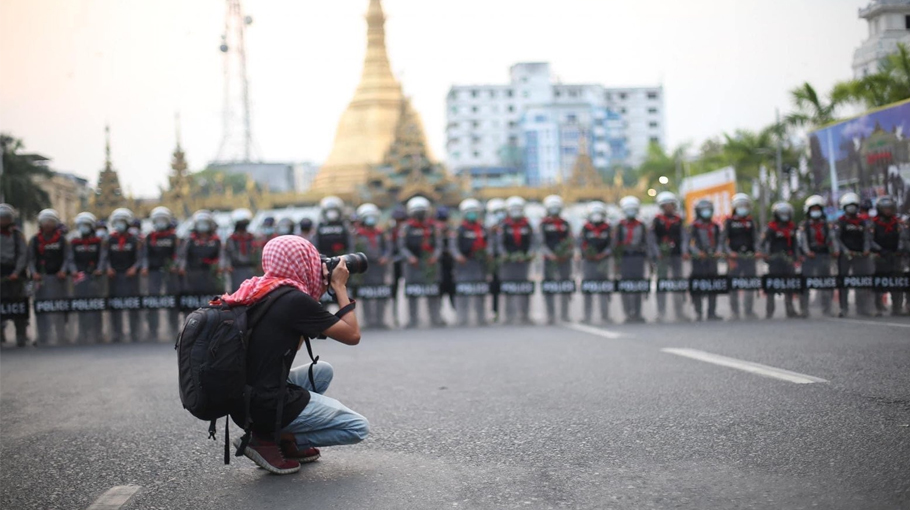‘Over 200 Myanmar journs jailed since 2021 coup’

Since the 2021 military coup Myanmar has become one of the worst countries in the world in terms of jailing journalists, detaining more than 200 over the past three years, according to the latest report by the International Center for Not-For-Profit Law (ICNL).
The ICNL said a total of 206 journalists including 31 women reporters from almost 100 media outlets in Myanmar had been arrested by the junta as of February, since the coup in February 2021.
Of those, 147 journalists were released from prison after serving an average of six months. The other 59 are still held behind bars by the military regime. Three journalists have been killed in detention by junta troops, the report said.
However, Reporters Without Borders puts the number of slain journalists higher, saying at least five have been killed by the junta since the coup.
The ICNL report also said that the military junta has charged 160 out of the total of over 200 journalists with crimes under nine separate laws, mainly those dealing with incitement and publishing “false news”, as well as the regime’s weaponized counter-terrorism provisions.
It also pointed out that the junta’s sham courts have ignored domestic and international law and disregarded due process, jailing the journalists for long terms of up to 20 years.
The military has detained many journalists in an effort to control the country’s information ecosystem, to keep the general public unaware of the crackdown and deter more widespread dissent and insurrection, it said.
However, Myanmar’s journalists and media outlets remain “bravely committed to building a robust information ecosystem for a public desperately seeking to know the truth about military oppression,” it added.
Friday marks the third anniversary of the Myanmar junta’s launch of a campaign of oppression against press freedom in the Southeast Asian nation. Under the crackdown, the junta raided the offices of media outlets, revoked their publication licenses and arrested journalists.
On March 8, 2021, the military junta revoked the publishing licenses of five local independent media outlets—7Day News, Myanmar Now, Mizzima, DVB and Khit Thit Media—without giving a reason.
Meanwhile, junta troops raided the offices of three media outlets in Yangon on March 8 and 9 of that year.
During the raid on the office of Kamayut News in Yangon’s Kamayut Township on March 9, junta troops arrested co-founder Hanthar Nyein and editor-in-chief Nathan Maung. Despite the junta’s ban, all of those media outlets except 7Day News continue to report.
Before the crackdowns on the media offices, the junta had arrested nearly three dozen journalists during the military’s lethal crackdowns on peaceful anti-regime coup demonstrations.
Hours before the military regime’s first press conference on Feb. 16, 2021, The Irrawaddy learned that it had been charged under Article 505 by the military regime. After being tipped off by a military official, a journalist from The Irrawaddy narrowly escaped arrest by deciding not to attend the press conference.
However, the military regime officially ordered the closure of The Irrawaddy and revoked its publication license in late October 2022 after taking a series of unannounced actions and raids against its Yangon office. The Irrawaddy’s website had already been banned by the regime inside Myanmar.
Several weeks before the junta’s official ban on the news agency, the regime arrested its publisher U Thaung Win, who remains in custody. A former photojournalist who once worked for The Irrawaddy, Zaw Zaw, was jailed for three years in August 2022.
One staff member was temporarily detained earlier in 2022, and the home of one of the news organization’s editors was raided.
Citing a 2023 prison census, the Committee to Protect Journalists recently said that Myanmar had become the second-worst jailer of journalists after China, with 43 media staff arrested last year.
The ICNL also urged stakeholders including the United Nations to strengthen support for detained journalists and for the media, ensuring it adequately reflects their roles as the “oxygen of the ongoing movement for a return to democratization”.


